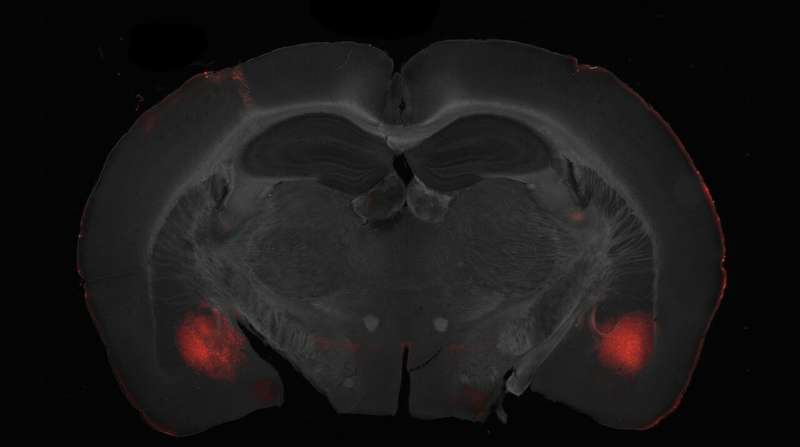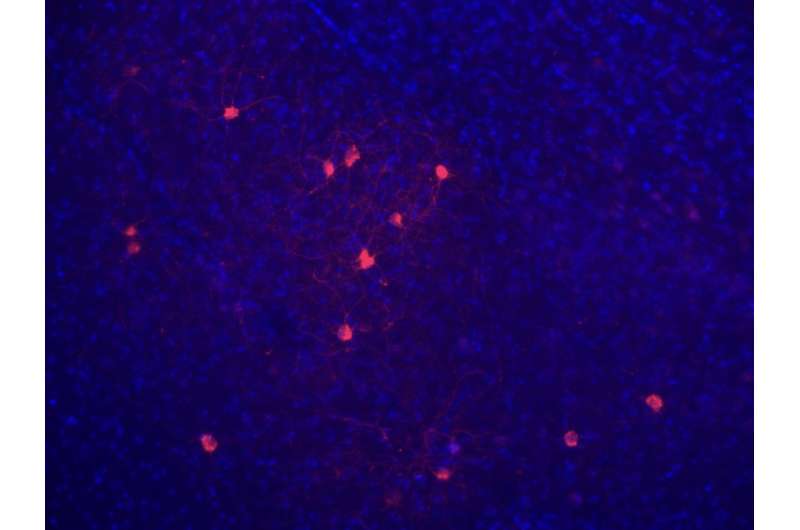
Humans and animals can exhibit a wide variety of behaviors when interacting with their peers. These include both prosocial behaviors, voluntary actions aimed at supporting or helping others, and selfish or opportunistic behaviors, which prioritize one's own needs or desires.
Several past neuroscience studies have investigated the neural processes involved in social connection, particularly in terms of the brain regions and neurotransmitters associated with bonding or intimacy. However, so far very little is known about the brain mechanisms underlying selfish or altruistic actions.
Researchers at the Italian Institute of Technology (IIT) and University of Milan have recently carried out a study aimed at filling this gap in the literature, by examining the activation and firing of neurons in the mice brain as the animals engaged in prosocial or selfish behaviors.
Their paper, published in Nature Neuroscience, identifies a series of prosocial or selfish behavior-specific reciprocal connections between neurons in the prefrontal cortex and amygdala, two brain regions associated with complex behavioral planning and emotional regulation, respectively.
"Over the past years, I felt a loss of the common sense of collectiveness, even before the pandemic, that contributed to self-centered concern and a disregard of others," Diego Scheggia, one of the researchers who carried out the study, told MedicalXpress. "Of course, recent physical distancing and quarantine policies further disrupted our daily social interactions and resulted in increased social isolation. The goal of my recent study was to understand the social factors and neurobiological determinants of altruism and self-interest."
To examine the neural mechanisms underpinning altruistic and selfish behaviors, Scheggia and his colleagues first designed a new experimental task that would encourage these different types of behaviors in animals. This social decision-making task offered animals two simple choices: sharing a reward with their peers or not. The researchers then used this task to perform an experiment on several adult mice.
"The task we used was modeled on the human game-theoretical paradigm known as the 'dictator game' in which a 'dictator' decides whether to share a reward with a conspecific," Scheggia explained. "In this task, we measured the neural activity of the basolateral nucleus of the amygdala that show substantial differences between prosocial and selfish subjects."

Essentially, Scheggia and his colleagues found that the mice's decision to share their food reward with other mice depended on several factors. These factors included the mice's level of familiarity with their peers, their sex, previous social contacts, levels of hunger, hierarchical status and their emotional attunement.
Subsequently, the researchers used chemogenetics, techniques that entail the use of synthetic drugs to manipulate specific brain pathways, to silence the activity of some neurons. This allowed them to determine whether silencing specific neurons automatically resulted in more prosocial or selfish behaviors.
"We observed that silencing the neurons in the prefrontal cortex that are connected to the basolateral amygdala modulated choices guided by self-interest," Scheggia said.
The results gathered by this team of researchers highlight the role of neurons in the basolateral amygdala (BLA) in promoting prosocial decisions. Specifically, they suggest that BLA neurons projecting on the prelimbic (PL) part of the prefrontal cortex mediate the development of a preference for altruistic choices in mice. In contrast, the preference for selfish behaviors appeared to be mediated by the projection of neurons in the PL prefrontal cortex to the BLA brain region.
In the future, the findings of this study could pave the way for interesting new discoveries about the impact of interactions between neurons in the amygdala and prefrontal cortex on the nature of animal behaviors. The work by Scheggia and his colleagues also outlines a possible neurobiological model of altruistic and selfish choices, which could help to better understand the issues with social decision-making associated with some psychiatric disorders.
"As a result of the pandemic, more selfish and antisocial behavior have risen, thus threatening to multiply psychiatric diagnoses in the next few years," Scheggia added. "Unraveling the nature of brain mechanisms underlying social decision-making could represent a crucial step to suggest novel treatments for social dysfunctions and antisocial behavior that occur in several psychiatric conditions and neurodegenerative disorders. Building on the findings of our recent study, we are now exploring the role of previous experience and emotional memories on prosocial and selfish choices."
© 2022 Science X Network
Citation: Study identifies neural connections that regulate prosocial and selfish behavior in mice (2022, November 10) retrieved 10 November 2022 from https://ift.tt/IStpUM4
This document is subject to copyright. Apart from any fair dealing for the purpose of private study or research, no part may be reproduced without the written permission. The content is provided for information purposes only.
"behavior" - Google News
November 10, 2022 at 09:44PM
https://ift.tt/gXzktEZ
Study identifies neural connections that regulate prosocial and selfish behavior in mice - Medical Xpress
"behavior" - Google News
https://ift.tt/jHaPywT
Bagikan Berita Ini














0 Response to "Study identifies neural connections that regulate prosocial and selfish behavior in mice - Medical Xpress"
Post a Comment